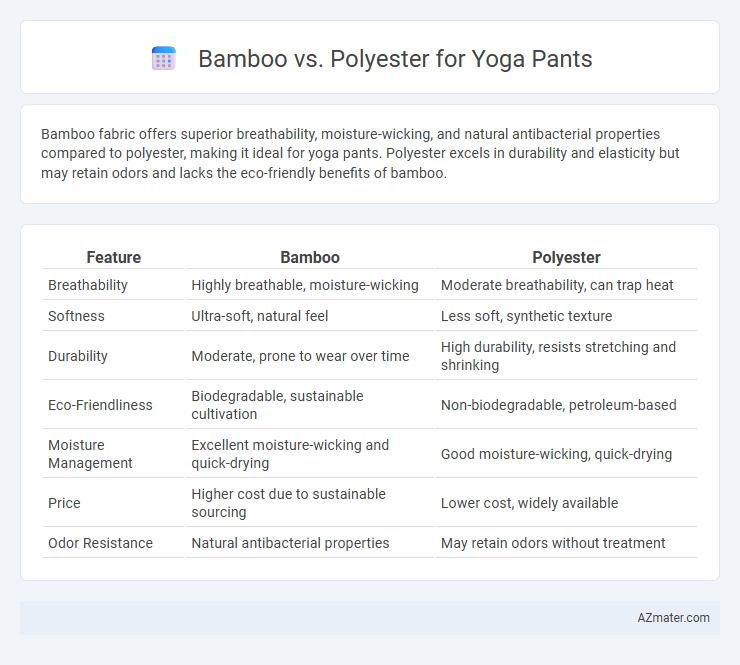Bamboo fabric offers superior breathability, moisture-wicking, and natural antibacterial properties compared to polyester, making it ideal for yoga pants. Polyester excels in durability and elasticity but may retain odors and lacks the eco-friendly benefits of bamboo.
Table of Comparison
| Feature | Bamboo | Polyester |
|---|---|---|
| Breathability | Highly breathable, moisture-wicking | Moderate breathability, can trap heat |
| Softness | Ultra-soft, natural feel | Less soft, synthetic texture |
| Durability | Moderate, prone to wear over time | High durability, resists stretching and shrinking |
| Eco-Friendliness | Biodegradable, sustainable cultivation | Non-biodegradable, petroleum-based |
| Moisture Management | Excellent moisture-wicking and quick-drying | Good moisture-wicking, quick-drying |
| Price | Higher cost due to sustainable sourcing | Lower cost, widely available |
| Odor Resistance | Natural antibacterial properties | May retain odors without treatment |
Introduction: Choosing the Right Fabric for Yoga Pants
Bamboo fabric offers superior breathability and natural moisture-wicking properties, making it an excellent choice for yoga pants aimed at comfort and sustainability. Polyester, known for its durability and quick-drying capabilities, provides strong support and shape retention during intense workouts. Selecting between bamboo and polyester depends on prioritizing eco-friendly softness versus performance-driven resilience in yoga apparel.
Understanding Bamboo Fabric
Bamboo fabric, derived from the pulp of bamboo grass, offers superior breathability and natural moisture-wicking properties that make it ideal for yoga pants. Its inherent antibacterial qualities reduce odor, enhancing comfort during intense workouts compared to polyester, a synthetic material prone to trapping sweat. Bamboo fabric's eco-friendly nature and softness provide a sustainable, comfortable alternative for activewear focused on performance and skin health.
Exploring Polyester Material
Polyester is a synthetic fiber known for its durability, moisture-wicking properties, and resistance to shrinking and stretching, making it a popular choice for yoga pants. Its lightweight and quick-drying nature enhances comfort during intense workouts by efficiently managing sweat and maintaining breathability. Compared to bamboo, polyester offers greater shape retention and colorfastness, ensuring longer-lasting wear and vibrant designs.
Breathability: Bamboo vs Polyester
Bamboo fabric offers superior breathability compared to polyester, thanks to its natural moisture-wicking properties and porous fiber structure that allows better air circulation and helps keep the skin dry during yoga sessions. Polyester, while durable and moisture-resistant, tends to trap heat and moisture, reducing overall comfort and breathability. Choosing bamboo for yoga pants can enhance airflow and temperature regulation, making it ideal for intense workouts and hot yoga.
Moisture-Wicking Performance
Bamboo fabric excels in moisture-wicking performance due to its natural micro-gaps that allow efficient sweat absorption and quick drying, making it highly breathable for yoga pants. Polyester is engineered with hydrophobic properties that rapidly pull moisture away from the skin to the fabric's surface, ensuring consistent dryness during intense workouts. Bamboo offers a softer, more eco-friendly alternative, while polyester provides durability and superior moisture management in synthetic form.
Comfort and Skin Sensitivity
Bamboo yoga pants offer superior breathability and natural moisture-wicking properties, making them highly comfortable and ideal for sensitive skin due to their hypoallergenic and antibacterial qualities. Polyester fabrics, while durable and quick-drying, can sometimes trap heat and cause irritation for those with sensitive skin. Bamboo materials provide a softer, smoother texture that reduces friction and enhances overall comfort during yoga practice.
Durability and Longevity
Bamboo yoga pants offer natural durability due to their strong, flexible fibers that resist pilling and maintain shape over time, making them ideal for consistent use. Polyester yoga pants excel in longevity with their high resistance to abrasion, stretching, and shrinking, ensuring they retain fit and color even after multiple washes. While bamboo fabrics provide eco-friendly comfort, polyester's synthetic strength generally results in longer-lasting performance for activewear.
Eco-Friendliness and Sustainability
Bamboo yoga pants are highly eco-friendly due to bamboo's rapid growth and minimal need for pesticides or fertilizers, making it a sustainable fiber that reduces environmental impact. Polyester, often derived from non-renewable petroleum, has a higher carbon footprint and contributes to microplastic pollution unless recycled variants are used. Choosing bamboo over conventional polyester supports sustainability by promoting biodegradable fabric and reducing reliance on fossil fuels.
Price Comparison: Bamboo vs Polyester Yoga Pants
Bamboo yoga pants typically cost more than polyester due to the sustainable cultivation and processing methods required for bamboo fabric. Polyester yoga pants are often more budget-friendly, benefiting from mass production and lower raw material costs. Consumers seeking eco-friendly options may accept higher prices for bamboo, while those prioritizing affordability usually select polyester.
Which Is Better for Your Practice?
Bamboo yoga pants offer superior breathability, moisture-wicking, and natural antibacterial properties, making them ideal for intense or hot yoga sessions. Polyester yoga pants excel in durability, stretch retention, and quick-drying capabilities, suitable for high-impact workouts and frequent washing. Choosing between bamboo and polyester depends on whether you prioritize eco-friendly comfort and softness or long-lasting performance and shape retention in your yoga practice.

Infographic: Bamboo vs Polyester for Yoga Pant
 azmater.com
azmater.com